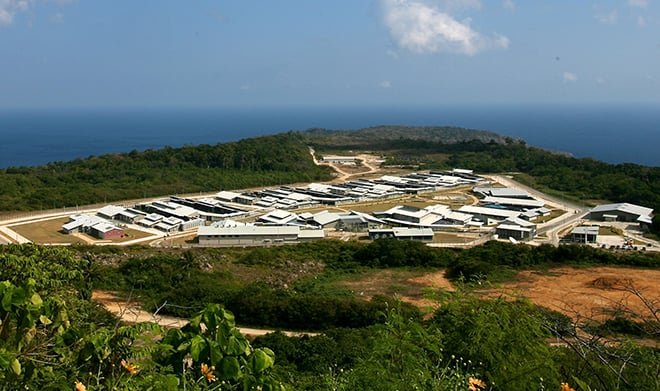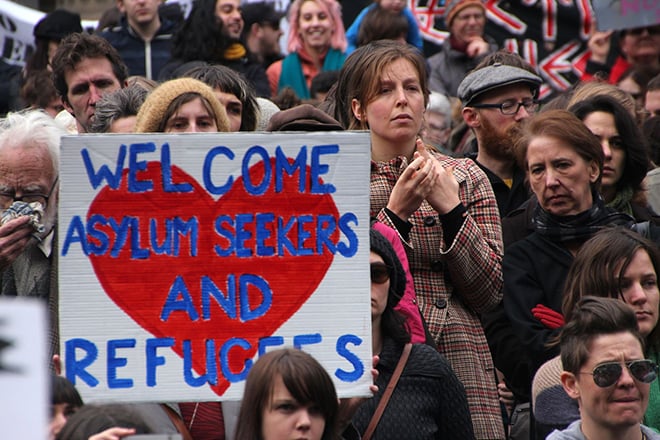“Australians Are Not Racist; They Just Don’t Know The Reality”: The Story Of Afghan Refugee Ramazan Kawish
"The government says we come here illegally. The media is not telling people the reality. It’s normal to fear things when you are told they are scary."

33-year-old Afghani refugee Ramazan Kawish has been attacked by warlords at his work. He’s been severely beaten by unknown assailants on the way home from the movies. He’s been run off the road and lost most of his eyesight as a result. He’s spent four nights crammed in a ramshackle boat with 128 other asylum seekers with scarce food, water and fresh air, soaked in the stench of human excrement and unsure he would live to see the next sunrise.
Still, the anonymity of his experience in Australian detention centres ranks as one of the most mortifying in his memory. “Living without identity kills you every day. Every time they call your number, you die,” he says.
–
Life Before The Boat
Kawish is an articulate and intelligent man of many talents. Speaking six languages and with an academic background in social science, he worked as a teacher, translator, tour guide, radio producer, project manager and businessman in the early-mid 2000s. In 2004, he landed a job with the UN helping to conduct the first presidential election in Afghanistan. This role took him out of his home in Bamyan in the centre of the country and into Taliban-controlled areas. “If the Taliban found my UN identity card [here], I would have been killed,” he says.
Undeterred, he served the UN again in 2005 for the first parliamentary elections. Refusing local warlords who tried to use their wealth and power to buy their way into government, Kawish began to face grave danger. As a principled man committed to civic duty, he faced many threats to his life. Several violent encounters left him completely blind for four months, until surgery partially restored sight in one eye.
After some years hiding out in Pakistan and India, Kawish returned to Afghanistan with the hope of further serving his community. The dream was short-lived. His friend passed on a letter from the same people who had accosted him years earlier. The threat to Kawish’s life was there in black and white. His brother pleaded with him to leave Afghanistan: “You lost your eyes. I don’t want you to lose your life”. It was time to find permanent refuge in a country where he could contribute to his community freely.
–
The Only Way Out
Kawish had grave concerns about his decision after many hours on the Internet. “I researched the detention centres, the boat journey, the Australian people and culture. I knew the decision was very difficult and would have a bad impact on my future life. People would think I avoided the queue, but there is no queue — you have to find your own way,” he says.
He began the exhausting journey to Australia. His passport brought him by plane as far as Thailand. Kawish then paid $2,400 to people smugglers for 24 hours on a train, 10 hours hidden under a blanket in the back of a car to Kuala Lumpur, and more time on a boat to Indonesia. Another $4,000 packed him into a rickety vessel headed for our shores with more than 100 others. Many took sleeping pills because “they would prefer to be asleep when they die”.
When the boat was intercepted by the Australian Navy, everybody cheered. Kawish, like his fellow travellers, was lonely, weak, and 8kg lighter than when he left Afghanistan. On his way to Christmas Island, he felt hopeful the Australian government would look after him. Unfortunately, it was more complicated.
–
“They Don’t Count Me As Human”: The Time In Detention
“I thought there might be open areas because it’s an island — you don’t need security. Instead there were huge fences, walls, big gates and many locks,” he says. Feeling like a prisoner, Kawish was also tormented by his own mind. “I had a bad feeling. I felt guilty. I felt shame for leaving my family in danger. I was still suffering and this is usual for everybody.”
This was made worse when Kawish discovered that the young man who had previously slept in his bed had hung himself. “For three nights I could not sleep. I had terrible dreams. It happens a lot. I saw many people harm themselves on Christmas Island.”
Like all asylum seekers under Australia’s immigration regime, Kawish was also stripped of his name. “If you lose your identity, even for one day, it hurts a lot,” Mr Kawish says. “First, I feel like I’m in jail. In jail they have a number on their back; I’ve seen it in movies. Second, I’m not a human here because every human has a name — a baby, even for one minute, should not be without a name.” He says it states in the Quran, “before your child is born, put a name on it”. To fail to give a child an identity is to commit “the biggest crime”. “I don’t have my identity [on Christmas Island], so they don’t count me as human”.
He wishes Australians could empathise with this, even for a brief time. “If you were one hour in a detention centre or on a boat without identity, you could think how much they suffer.”

Image via Wikicommons.
His transfer to a Tasmanian detention centre offered little relief. One day, after hearing some commotion at the football field, he ran out of his quarters to see an Iraqi man shoulder-deep inside a hole, trying to bury himself alive. The desperation of this man was familiar to Kawish.
“I suffered in Afghanistan, and then I suffered all the way here,” he recalls. “I paid a lot of money, and now I’ve ended up in prison. At which point did I do wrong? You have to do some bad things to be in jail. The only answer is I was born in a bad place in a bad time. The only other reason: I came here by boat.”
Kawish speaks at length about how hard it was to cope in this hothouse environment of concentrated suffering. “You are dying every moment in a detention centre. You want to share your pain with other people. Everyone wants to release their pain, and everyone wants to share their stories. They make you sad, they make you hopeless. You feel like you are burdening other weak people.”
Yet compared to most people arriving in Australia by boat, Ramazan Kawish is one of the lucky ones. After six months in detention he was granted refugee status and allowed to permanently settle in Sydney. His assiduous efforts to keep travel documents and written evidence of persecution around his neck at all times during his passage to Australia helped his case — an impossible dream for many of those he left behind.
–
Life In Australia
Life as a free man in Australia has had its rewards. Kawish was able to sponsor his wife to join him here and they have just become parents for the first time. Yet while he is physically safe, Kawish says “my mind is not safe.” He deals with the memories of a traumatic past from both Afghanistan and here in Australia. He is separated from his family back home and grieves for his lost eyesight.
He also wrestles with the challenges of fitting into a new society. Australia is a “100 percent opposite culture [to Afghanistan],” he says. “Back there, neighbours come together every day and talk to each other. Here, it doesn’t happen. People are inside at home or at work. If you’re at a park you can’t talk to kids or strangers. In Afghanistan, you go somewhere, you go talk to kids you don’t know, you play with those kids and everyone enjoys themselves.”
Another difficulty is his struggle to find work. He has spent years with a job seeker agency with only a part-time car wash job to show for it. That this is the case for a man as highly-skilled, experienced, and motivated as Ramazan Kawish poses serious questions about the barriers to cultural integration in Australia.
Despite this hardship, Kawish remains as committed as ever to serving his new community. In this country, that means being a refugee advocate and he suggests some commonsense policies as a good starting point. He would love to see fewer lives lost at sea but believes the humane way to do that is “to increase the number of refugees from the UNHCR”. “Then fewer people will get on boats,” he explains. “[Right now, there is] no hope from the UNHCR, which is why they risk their lives.”
He makes particular calls for the government to open the door to refugee applications from Indonesia. He says that these desperate people are essentially stuck in a house which is on fire. “Australia has closed every door to the house,” he says. “At least one door should be open.”
Although he is critical of government policy, Kawish remains overwhelmingly positive about Australian people. He knows many doctors, lawyers and ordinary people support refugees and feels included in much of community life. He speaks of the way many Australians share their happiness with him and encourage him to enjoy life. Kawish even understands anti-refugee sentiment in some parts of the community.
“Australian people are not racist … they just don’t know the reality,” he says. “If they found the information, if they knew about the real life of a refugee, they wouldn’t call them queue jumpers. The government says we come here illegally. The media is not telling people the reality. It’s normal to fear things when you are told they are scary.”
Because of this, Kawish calls for our people to take up the mantle of dissipating these fears and welcoming refugees on their own terms. “We can’t rely on the government or the media, but we can rely on ourselves, our society, and our communities. We need to ask ourselves, what can each of us do to help asylum seekers?”
–
Ramazan Kawish was interviewed in association with an ongoing series of talks organised by the Refugee Council of Australia and People Just Like Us. These are now being hosted by the City of Sydney with the next instalment happening in Potts Point tomorrow night. More details here.
–
Liam McLoughlin is a freelance writer who is sweet on activism and the arts. He blogs at Situation Theatre and tweets from @situtheatre.
–
Feature image via John Englart/Creative Commons.


